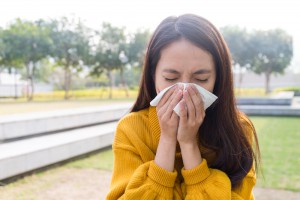Five things to know about beating seasonal allergies
Posted: April 14, 2016
Spring is here and with it comes blooming flowers, high pollen counts, and other seasonal allergy triggers—leaving millions to bear through the season, or take medication to reduce symptoms. Linda MacConnell, PA-C, MAEd, MPAS, assistant professor at ATSU-Arizona School of Health Sciences, suggests these tips to curb uncomfortable seasonal allergies.
- Start with control. The best way to beat drowsiness caused by allergies is by controlling them. Try to hone in on what works and what doesn’t. Allergy medications may cause drowsiness and fatigue in some, and decongestants you may rely on are stimulating and cause insomnia or other sleep disturbances.
- Decreasing indoor allergies—like dust or mold. A HEPA filter for your bedroom and using hypoallergenic coverings for pillows and mattresses can help, along with daily vacuuming and frequent dusting.
- Curb late-night snacking. Good sleep hygiene is important for all, especially with allergies. A ‘nightcap’ may sound relaxing, but alcohol interferes with breathing and obtaining restful sleep. Late-night eating can also cause reflux and irritate the nose and sinuses.
- Schedule a checkup. A comprehensive checkup may rule out any fatigue-causing diseases like fibromyalgia, thyroid problems, or sleep apnea, which can mimic allergies. In addition, allergy testing helps to identify foods that might aggravate allergies
- Nurturing nutrients. MacConnell notes the following five nutrients may decrease allergies naturally while increasing energy:
Magnesium opens breathing passages. Take a 200mg supplement or better yet, eat magnesium–rich foods like spinach or kale. Magnesium can also be absorbed while bathing in magnesium bath salts. Probiotics help the immune system and are found in foods like miso, Greek yogurt, and kefir. Vitamin C, long a go-to for colds, is also good for allergies as it lowers the release of histamines. Bioflavonoids like brussel sprouts, garlic, mangoes, and green tea reduces production of histamines. Quercetin also decreases histamine and is found in apples, especially Granny Smiths, onions, parsley, and sage.